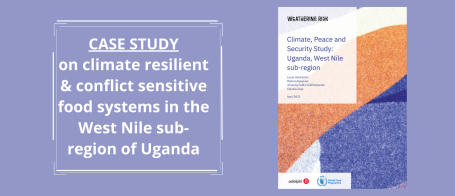Climate, Peace and Security Study: Uganda, West Nile sub-region
Download the ful report here.
Over the past 20 years, the northern regions of Uganda, including the West Nile sub-region, have experienced an increase in average temperature and heatwaves, more unpredictable rainfall and increased crop and land exposure to drought. The livelihoods and food security of people in West Nile are highly dependent on rain-fed subsistence farming which is vulnerable to shocks and adverse weather events related to climate change and climate variability. Droughts in West Nile have already resulted in scarcities at local food markets and inflated the prices of food staples. Even people with access to normally fertile lands have faced severe climate driven variability in recent years, contributing to increasing livelihood insecurity.
The West Nile sub-region also experiences risks related to climate- and conflict-induced migration and displacement. The further deterioration of the security situation in South Sudan could result in a renewed influx of refugees in the West Nile, which has already put the local environment under strain. Access to aid and development resources, including food distributions, has become a point of contestation between host and displaced communities. This increased pressure on livelihoods and food security has the potential to drive communal conflict. As intra and inter-communal conflict in West Nile over access to and use of forestry, water, fertile land and aid risk to worsen with demographic pressures, climate change and environmental degradation, this report explores ways to build resilient livelihood and food systems which also contribute to peaceful societies. With some progressive policies that welcome refugees and numerous programmes that promote intercommunal relations, there are many lessons to be learned and best practices to be drawn from the West Nile context, which could also be applied in other settings.
For more than 60 years, the World Food Programme (WFP) has been embedded in communities most in need to bring-life saving assistance as well as supporting sustainable and resilient livelihoods. In recent years, WFP has been one of the key humanitarian actors in the West Nile to support refugees. The primary focus for WFP in West Nile has been crisis response via in-kind and cash-based general food assistance for refugees. This report explores additional avenues for WFP to contribute to building climate-resilient food systems and sustainable peace.
Share on


